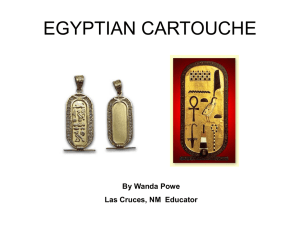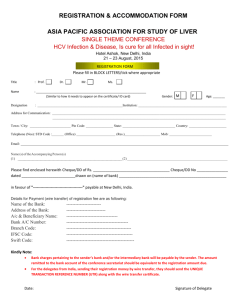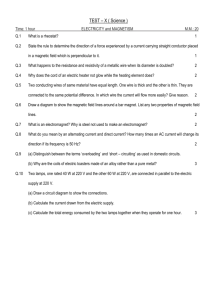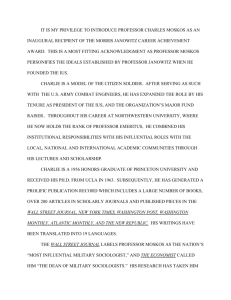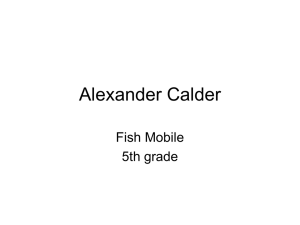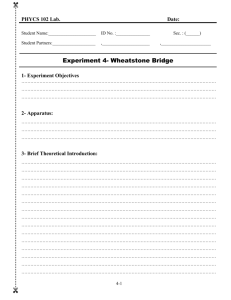Syllabus 2011 (1)
advertisement
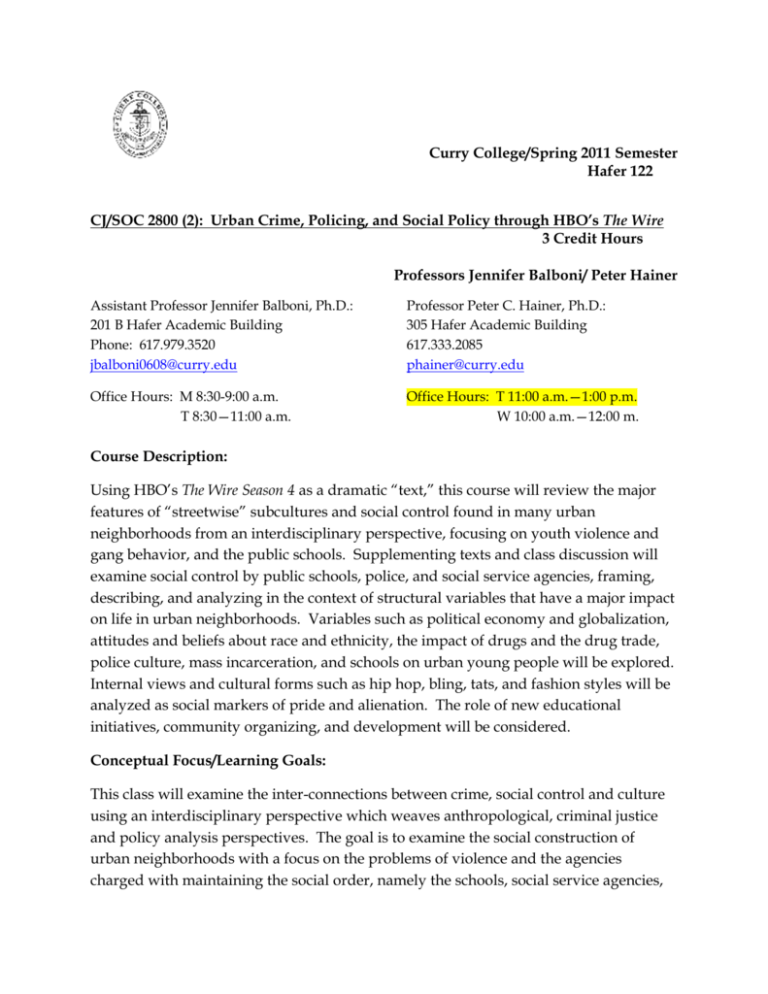
Curry College/Spring 2011 Semester Hafer 122 CJ/SOC 2800 (2): Urban Crime, Policing, and Social Policy through HBO’s The Wire 3 Credit Hours Professors Jennifer Balboni/ Peter Hainer Assistant Professor Jennifer Balboni, Ph.D.: 201 B Hafer Academic Building Phone: 617.979.3520 jbalboni0608@curry.edu Professor Peter C. Hainer, Ph.D.: 305 Hafer Academic Building 617.333.2085 phainer@curry.edu Office Hours: M 8:30-9:00 a.m. T 8:30—11:00 a.m. Office Hours: T 11:00 a.m.—1:00 p.m. W 10:00 a.m.—12:00 m. Course Description: Using HBO’s The Wire Season 4 as a dramatic “text,” this course will review the major features of “streetwise” subcultures and social control found in many urban neighborhoods from an interdisciplinary perspective, focusing on youth violence and gang behavior, and the public schools. Supplementing texts and class discussion will examine social control by public schools, police, and social service agencies, framing, describing, and analyzing in the context of structural variables that have a major impact on life in urban neighborhoods. Variables such as political economy and globalization, attitudes and beliefs about race and ethnicity, the impact of drugs and the drug trade, police culture, mass incarceration, and schools on urban young people will be explored. Internal views and cultural forms such as hip hop, bling, tats, and fashion styles will be analyzed as social markers of pride and alienation. The role of new educational initiatives, community organizing, and development will be considered. Conceptual Focus/Learning Goals: This class will examine the inter-connections between crime, social control and culture using an interdisciplinary perspective which weaves anthropological, criminal justice and policy analysis perspectives. The goal is to examine the social construction of urban neighborhoods with a focus on the problems of violence and the agencies charged with maintaining the social order, namely the schools, social service agencies, 2 and the police. The texts for this course present entirely different perspectives on inner city life. Starting with HBO’s The Wire, Season 4 and using episodes each week as a theme and dramatic focus, we will then look at Peter Moskos’ Cop in the Hood, which focuses on policing urban neighborhoods, Sudhir Venkatesh’s Gang Leader for a Day, which presents an internal perspective on drug dealing and gangs in Chicago from an ethnographic perspective, and Paul Tough’s book, Whatever It Takes, looking at community based reform efforts to address the structural problems of poverty, youth violence, schools, and the police, and suggests strategies to rebuild social institutions. Additionally we will read an article by Elijah Anderson excerpted from his book Code of the Street: Decency, Violence, and Moral Life of the Inner City, an ethnographically based account of “streetwise” sub-cultural life. Our hope is that these resources will help students learn about and understand the complexities of life in urban poor neighborhoods and some of the strategies for problem solving and positive social change. At the end of this course you will expected to be able to describe the social construction of urban neighborhoods, the meaning of categories such as “ghetto” and “inner city” and tell us how they are useful or engender stereotypes; describe the different perspectives on urban poor communities that are drawn from crime statistics, ethnographies, and scholarly accounts; understand how race and ethnicity influence people’s attitudes and behaviors; understand the “structural” implications of political and social organization in these neighborhoods, identifying the impact of poverty and institutions which exercise formal social control, such as the police, the courts, and public schools; evaluate the differences in perspective in the kind of knowledge and its impact in dramatic narratives, ethnographies, case studies, and scholarly articles; understand the impact of drugs and violent crime on communities locally and more globally in cities across the country and across the globe; and understand and evaluate the role of new educational initiatives, community organizing, and development in providing positive community change. Prerequisites: Sociology 1000/1600, Anthropology 1020, CJ 1000 (Introduction to Criminal Justice) and/or, CJ 2000 (Criminology) or by permission of professor. 3 Required Texts/Media: The Wire, Season 4. HBO Entertainment. Tough, Paul. 2008. Whatever It Takes: Geoffrey Canada’s Quest to Change Harlem and America. Boston: Houghton Mifflin. ISBN: 978-0-618-56989-2. CHOOSE from ONE of the following: Moskos, Peter. 2008. Cop in the Hood: My Year Policing Baltimore’s Eastern District. New Jersey: Princeton University Press. or Venkatesh, Sudhir. 2008. Gang Leader for a Day: A Rogue Sociologist Takes to the Streets. New York: Penguin Press. Additional Required Reading (posted on Blackboard site): Anderson, Elijah. 1999. Code of the Street: Decency, Violence, and Moral Life of the Inner City. New York, New York: Norton & Company. (Selected excerpts.) Requirements and Expectations: Your grade will be comprised of four major components: Class Discussion: 20% Writing Assignments: 25% Group Project: 20% Group Presentation: 10% Final: 25% Class Discussion This is a seminar-style course designed for students with a background in criminal justice, sociology, or anthropology. The course will be structured on prior coursework and designed to stimulate discussion around the weekly The Wire episodes and reading assignments with the goal of developing a critical discourse in class geared toward understanding, viewing social problems from multiple perspectives, and working toward social solutions and problem solving. For this reason, the class will engage in more discussion than traditional lecture 4 format. In some classes we will engage in role playing and actively “take sides” in case study scenarios. Students must come to class prepared, having viewed The Wire episodes for the week as well as the assigned reading, prepared to engage in critical discussion. It is important to note that students are welcome to disagree—in fact, often well argued disagreements can push us all to consider other viewpoints and understand things more critically. However, our hope is that each of you will move beyond opinions based on “feelings” alone and learn to support your beliefs with behavioral evidence drawn from careful, thoughtful observation and thought. That said, the discussion in the class must be both respectful and collegial. Short Writing Assignments: 25 points total (8.5 each) There will be three 1-2 page (minimum 200 word, maximum 400 word) writing assignments that ask you to reflect on the readings and/or HBO’s the Wire. Please directly cite the material which you use in your response, using specific examples to make your point and support your position. Writing Assignment #1, choose ONE of the following questions (depending on your book choice): (Cop in the Hood) What part of Moskos’ description of the police academy impressed you (positively or negatively) the most? Also, do you feel this training is good preparation for a career in law enforcement? Why/why not? Or (Gang Leader for a Day) How is JT different or similar to media images of a gang boss? What services do JT and his gang provide to the community? Due Feb 9th. Writing Assignment #2, choose ONE of the following questions: Consider the ending of Cop in the Hood. What is Moskos saying about the War on Drugs? Do you agree with him? Now that you have finished Gang Leader for a Day, please discuss the community's relationship to the police in the book. Why doesn't Boo-Boo (or anyone else) call them when a crime occurs? How is it handled instead? What choices realistically exist for community members? Due March 9th. 5 Writing Assignment #3: Choose one of the following questions: 1. What are your impressions of Baby College and some of its students? Pick one person that is described in this section and discuss what you believe the impression Baby College will have on their parenting. 2. Do you believe that the Harlem Children’s Zone can achieve its goals? Place state simply what those goals are, and why you believe they can or can not achieve them. Due April 6th. Final Paper/Project Working in small groups, students will need to choose an agency or program that works with an inner city population (either in Boston or another city) and find out the mission of the program (what does it intend to do?) and its strategy (how does it work?). This could include a school or pre-school program, a juvenile justice program, or another social service program. Students must identify the specific population that is targeted, what resources (financial and human) are used to achieve their goals, and provide demographic information about the people that are served. Ideally, students will interview one or more staff members to provide additional background. Early in the semester, students will submit the name of the agency they choose to be reviewed by the professors. In addition to the field research, students must provide some review of what the literature has suggested about these types of programs. For instance, if you chose a particular Head Start program, you would want to reference literature on the progress and effectiveness of similar programs. Students may want to use information or contacts from any internships that they may have had. Finally, in the conclusion of the paper, students will need to summarize their own impressions of this program. What evidence did they find to support their impressions? Did their field research and library research leave them feeling hopeful? Disappointed? Ambivalent? Students need to explain what impact they feel such a program might have. The paper should be approximately 4-6 pages in length and conform to APA citation style. At the end of the semester, students will lead a class discussion on their designated agency. Any visual material (pictures, diagrams, etc.) or Powerpoint to help the class better understand the mission of the agency is welcome. Presentations should be approximately 20 minutes long. 6 Final Exam Students will be required to complete a final exam inclusive of the reading material and discussions covered in class. The format will be essay. More details and study tips guides will be forthcoming as the semester progresses. UnWired/Wired/General Expectations for this class: Being Connected to the class. Many Curry College faculty members have differing opinions about the use/abuse of wireless devices. We thought we might experiment this semester and give you some freedom and choice about how you engage with this class, but only if you all agree to play by these rules: • Students may be wired any way they like as long as students are connected to this class, participating, and engaged. Please do this silently (no ring tones in class or phone conversations, please). • Think about/experiment with ways that social networking and online resources can help you learn about the course material and widen the conversation/learning. • With or without your wire we expect you to attend class, arrive on time, have your assignments done before class, turn in your paper on time, be prepared for your group project, pulling your fair share of the work weight, and participating in the class presentations. • Check the class Blackboard site for the syllabus, class resources and materials. Class Blog In addition to the class Blackboard link, Professor Hainer will launch a class blog to encourage a different kind of interaction with the material in the class. You may choose to submit your writing assignment to the blog or post generally in the blog for extra credit. Participation will be entirely voluntary but you will get extra credit for the course if you are a “frequent flyer” on the blog. The point of the blog will be to engage in discussions together beyond the classroom and encourage you to use your social networking links (Fb, Twitter, MySpace, YouTube) to bring your friends into our discussion and ask others to join in what we are trying to do. After each class Professor Hainer will post some commentary about our class and The Wire episodes and encourage you to comment. 7 Week by Week Schedule/Assignments [Please note that all assignments and The Wire episodes should be read/viewed/written before class. Please come to class prepared to connect.] Week of: Topic Assignments (To be read PRIOR to class) January The Historic and Social 19 Construction No reading assignment for the first class. of the “Inner City” January 26 Reading: (All) The Wire, Episodes 2 and 3 Choose One: Moskos, Cop in the Hood, Chapter 1 (The Departed) Venkatesh, Gang Leader for a Day, Chapter 1 (How does it feel to be black and poor?) Study Questions: Theories on What are your impressions of the schools in The Wire? Which of the characters do you Crime and believe will end up most criminally involved? Why? Poverty Cop in the Hood: Were you surprised by what Moskos said was his (and other officers’) “primary goal” for each shift he worked as a police officer? Why/why not? How might this goal affect how he and his fellow officers do their jobs? Gang Leader for a Day: In the first chapter, what are your impressions of "Old Time" and his friends? How did he feel about race relations? Do you agree? Why/why not? What did you think about Sudhir's first visit to South Lake Park? Was he bold, ambitious, stupid, or something else? (Or all of the above?) 8 Create Groups and think about which organizations you might research. February 2 Reading: The Wire, Episode 4 Elijah Anderson, “Code of the Streets,” Atlantic Monthly online, May 1994 Moskos, Cop in the Hood, Chapter 2 (Back to School) Venkatesh, Gang Leader for a Day, Chapter 2 (First Days on Federal Street) Study Questions: Does Elijah Anderson’s code of the street to the characters in The Wire? How? Please cite examples. Urban Culture/ Artistic Evolution (Hip Hop, Rap) The Wire: What factors in the boys’ home life in the Wire will impact them as to whether they engage in drug dealing? Please explain if you believe you might react similarly or differently if placed in a similar situation. Cop in the Hood: What part of Moskos’ description of the police academy impressed you (positively or negatively) the most? Why? Gang Leader for a Day: How is JT different or similar to media images of a gang boss? What services does JT and his gang provide to the community? (Does this fit with the reading?) 9 February 9 Readings: The Wire, Episodes 5 and 6 Moskos, Cop in the Hood, Chapter 3 (New Jack) Venkatesh, Chapter 3 (Someone to Watch Over Me) Study Questions: The Wire Please consider Namond’s dilemma with his mother. What are his options? What should he do? Discuss “snitching” from the perspective of the kids in the Wire. Why is it such an important part of that culture? Urban Culture Cop in the Hood: Moskos stated that police often “dehumanize” anyone involved in the drug trade. What examples did you see of that dehumanization in his book (or in the Wire)? Do you see any ethical issues in such an approach? What similarities do you see from Moskos’ description of policing to the interactions between the characters on the Wire? Gang Leader for a Day How is JT different or similar to media images of a gang boss? What services do JT and his gang provide to the community? Please discuss the community's relationship to the police. Why doesn't Boo-Boo (or anyone else) call them when a crime occurs? WRITING ASSIGNMENT #1 DUE 10 Reading: The Wire, Episode 7 Feb 16 Moskos, Chapter 4 (the Corner) Policing Urban Environments and the War on Drugs Venkatesh, Chapter 4 (Gang Leader for a Day) Study Questions: What were Sudhir’s duties as gang leader for the day? What surprised you about these duties? What similarities do you see from Venkatesh’s description of life in that Chicago Housing project to the interactions between the characters in the Wire? What similarities do you see from Moskos’ description of policing to the interactions in the Wire? Do you think this style of policing makes a big effect? How so? Paper topic statement due Feb 23 Reading: The Wire, Episode 8 Moskos, Chapter 5 (911 is a Joke) and Chapter Six (Under Arrest) Venkatesh, Chapters 5 (Ms. Bailey’s Neighborhood) and 6 (The Hustler and the Hustled) Study Questions: Cop in the Hood: Why does Moskos believe that “911 is a joke?” Do you agree with this statement? In chapter six, War on Drugs Moskos talks about the how many people equate policing with arrests. Why is this type of (Part 2) assumption harmful? Gang Leader for a Day: Chapter Five starts off with Ms. Bailey "teaching" Sudhir about the rules in the projects. By the end of chapter 6, what does Sudhir learn about Ms. Bailey? Does she help the neighborhood? Who gets hustled in chapter 6? Why and how do residents hustle in the Robert Taylor Homes, according to Sudhir? 11 Readings: March 2 (All) The Wire, Episode 9 Paul Tough, Whatever it Takes, Chapters 1 (the Lottery) AND: Venkatesh, Chapters 7 (Black and Blue) OR: Moskos, Epilogue (School Daze) Study Questions: XXXXXXX?? In chapter One of Whatever it Takes, Canada mentions the “fade out phenomenon” of helping kids, only to have them return back to their “old” ways. Can you think of any examples of this phenomenon in your own life, in characters in the Wire, or any other person? What do you believe explains this phenomenon? Are the politicians in the Wire interested in improving the conditions in the inner city? What examples can you cite to support your point? How does the election affect policing strategies? Cop in the Hood: Moskos makes an argument to legalize drugs. What is his rationale? Are you persuaded by his reasons? Do you foresee any problems with this approach? Gang Leader for a Day: What did you think about the police that Sudhir came into contact with? Are the residents right not to trust all police? If you were a resident in these “projects,” would you trust the police? 12 Reading: March 9 The Wire, Episode 10 Paul Tough, Whatever it Takes, Chapters 2 (Unequal Childhoods) and 3 (Baby College) Chapter Two: What are your impressions of Baby College and some of its students? Pick one person that is described in this section and discuss what you believe the impression Baby College will have on their parenting. Effects of Mass Incarceration on American Cities Paul Tough writes that most parents entering Baby College feel corporal punishment is appropriate. Please discuss your thoughts on physical punishment, and how they relate to the position that Baby College teaches. In the Wire, how did the community view Wee-bay going to prison? What effect did this have on the family? In Chapter Two, Tough talks about how different aspects of parenting affect a child’s ability to learn and succeed in school. Please identify these things, and state whether in your experience, the research seems accurate. WRITING ASSIGNMENT #2 DUE March 16 March 23 Spring Break Enjoy your break. Stay Safe! Reading: The Wire, Episode 11 The Effects of Paul Tough, Whatever it Takes, Chapters 4 (Contamination) and 5 (Battle Mode) Globalization on American In chapter five, Tough deals with a fundamental question: Can good schools overcome bad environments? What do you think? Cities Consider the goal of the Harlem Children’s Zone and Geoffrey Canada’s approach to it. At this stage, do you believe he will win this “battle”? What things are out of his control that may sabotage the program’s intent? 13 March 30 Reading: The Wire, Episode 12 Paul Tough, Whatever It Takes, Chapters 6 (Bad Apples) and 7 (Last Chance) Study Questions: Urban Education Chapter Six: Do you feel the administrators for Harlem Children’s Zone middle school are expecting too much? Do you think this school is beneficial for the students? Please explain your answer. Please discuss the principal’s approach to the “disruptive” students at the Academy (in Whatever it Takes). How is this different than the program that Namond (from the Wire) attends? Which of these approaches do you believe will work: in the short run? In the long run? Explain your answer. In the Wire, what are the biggest obstacles the schools face in trying to educate the students? Which needs tend to get addressed? Which are neglected? Reading: April 6 The Wire, Episode 13 Paul Tough, Whatever It Takes, Chapters 8 (Conveyor Belt) and 9 (Escape Velocity) Study Questions: Urban Education (Part 2) Test scores become an important piece both in the Wire, and in the Harlem program. Paul Tough discusses the different test scores of the elementary and middle schools, and the elementary interventions were clearly bringing students up to grade level in subjects. What do you think this success means for these students? At the conclusion of Season 4 of the Wire, please comment on whether you were surprised by how the characters lives changed over the course of the season. Also, what is the most important thing you learned from watching the Wire? WRITING ASSIGNMENT #3 DUE 14 Reading: April 13 Whatever It Takes, Chapters 10 (Graduation) and Chapter 11 (What would it take?) Study Questions: The Future of What are your impressions of the potential of Harlem Children’s Zone? Do you believe it the American should be a model for other cities? Why/why not? City Does Geoffrey Canada break a major promise to the middle school students, or does he make an efficient decision for the Harlem Children’s Zone? Explain your position. Final Project Due April 20 Presentations TBA April 27 Presentations TBA Wednesday, May 5th 5:30 Final Exam Academic Honesty and Integrity Statement The College views academic dishonesty as one of the most serious offenses that a student can commit while in college and imposes appropriate punitive sanctions on violators. These offenses include, but are not limited to, cheating, plagiarism, unauthorized collaboration, or participation in academically dishonest activities. Plagiarism involves both using someone else’s work, as well as paraphrasing without proper attribution to the original author. It also includes submission of work previously submitted without prior knowledge of the corresponding professors. Please see your student handbook for a more detailed discussion on this topic. ****Students are responsible for understanding the contents of this syllabus. If you have a question or require clarification, you need to contact us as soon as possible. 15 Additional Resources: Levin Library Maintains an excellent online and in print set of criminal justice materials. You can access many online journals through the following portal: http://www.curry.edu/Academics/Levin+Library/Databases.htm Click on the “criminal justice” tab, and depending on your topic, one of the many databases to begin your search. Blackboard This course has a Blackboard website that includes the syllabus and contact information for the professor. You will also find information about obtaining the books. You can access this site through the Curry homepage, then click under students, then Blackboard. Academic Enrichment Center Students can seek assistance on a variety of tutoring related needs through this Center, free to Curry students. PAL Students with learning disabilities are encouraged to contact the Program for Advancement of Learning. This is a highly esteemed program tailored to meet individual learning needs. http://www.curry.edu/Academics/LD+Program+%28PAL%29/All+About+PAL/ ADA Accommodation If anyone has a diagnosed learning disability please let us know and we will make whatever reasonable accommodation we can to meet those needs. Faculty Biographies Professor Balboni is an Assistant Professor in the Department of Sociology and Criminal Justice. In the past, she has taught justice courses at the School of Professional and Continuing Studies and the College of Criminal Justice, both at Northeastern University. From 1997 through 2002, she worked as a Senior Research Associate at the Center for Criminal Justice Policy and Research, Northeastern University, notably working on projects involving juvenile justice and hate crimes, with published work well cited in both academic and policy arenas. She completed her Ph.D. in Law, Policy and Society at Northeastern University, with a focus on criminal justice and restorative justice issues. Her book, Clergy Sexual Abuse Litigation: Survivors Seeking Justice, will be released in March, 2011. Her original dissertation research looked at the meaning of 16 litigation against the Catholic Church for clergy sexual abuse survivors through an ethnographic lens. Additionally, Dr. Balboni worked in direct services with delinquent and abused/neglected youth for several years, in both residential and outreach and tracking settings. Peter Hainer is a Professor of Anthropology and Chair in the Department of Sociology and Criminal Justice. He received an A.B. in Anthropology from Brown University in 1969 and promptly found himself in Boston’s Grove Hall neighborhood as a community organizer and VISTA volunteer working with welfare recipients. For 15 years he lived in Boston’s Mission Hill neighborhood with his family and was active in community affairs and a board member of the Neighborhood Housing Service. During this time he pursued and earned an M.A. and Ph.D. in Anthropology from Brandeis University, doing anthropology field work on family and household composition in Boston’s African-American community. For 15 years he consulted and engaged in research for the U.S. Census Bureau’s Center for Survey Methods Research in Washington, D.C., including work on under enumeration and the decennial count, household organization, and ethnicity. He has continued anthropological field work intermittently but continuously for 30 years with over 7000 hours of observation with his informants in Roxbury and Dorchester. He has worked closely with police officers in the field in a number of communities since 1976 and, in recent years, has been a civilian member of two strategic planning groups for the Bureau of Professional Development with the Boston Police Department and an active member of the Regional Community Policing Institute for New England, serving on committees. **This syllabus, updated 1/12/11, is subject to change per the discretion of the professors. Students will be notified of any changes prior to the date.
